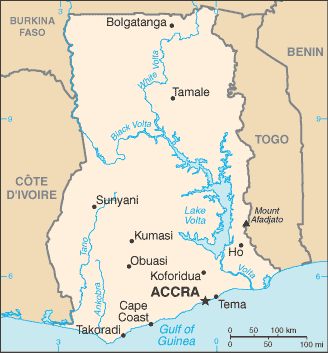| Ghana |
|
|
 |
|
| Geography | |
| Location: | Western Africa, bordering the Gulf of Guinea, between Cote d'Ivoire and Togo |
| Area: | total:
238,533 sq km land: 227,533 sq km water: 11,000 sq km |
| Natural Resources: | Gold, Timber, Industrial Diamonds, Bauxite, Manganese, Fish, Rubber, Hydropower, Petroleum, Silver, Salt, Limestone |
| Population and Health | |
| Population: | 25,758,108 (July 2014 est.) |
| Age structure: | 0-14 years: 38.6% (male 4,988,823/female 4,943,451) |
| Population growth rate: | 2.19% (2014 est.) |
| Birth rate: | 31.4 births/1,000 population (2014 est.) |
| Death rate: | 7.37 deaths/1,000 population (2014 est.) |
| Sex ratio: | at birth: 1.03 male(s)/female |
| Infant mortality rate: | total: 38.52 deaths/1,000 live births |
| Life expectancy at birth: | total population: 65.75 years |
| Total fertility rate: | 4.09 children born/woman (2014 est.) |
| Current contraceptive use among married women 15-49 years old(any method): | 34% (2007-2012) |
| Unmet need of contraceptive : | 35.7% (2008) |
| HIV/AIDS - people living with HIV/AIDS: | 235,800 (2012) |
| HIV/AIDS - deaths: | 11,600 (2012) |
| Literacy: | definition: age 15 and over can read and write |
| Economy | |
| GDP (purchasing power parity): | $90.41 billion (2013 est.) |
| GDP (official exchange rate): | $45.55 billion (2013 est.) |
| GDP - real growth rate: | 7.9% (2013 est.) |
| GDP - per capita (PPP): | $3,500 (2013 est.) |
| GDP - composition by sector: | agriculture: 21.5% |
| Labor force - by occupation: | agriculture: 56% |
| Inflation rate (consumer prices): | 11% (2013 est.) |
| Agriculture - products: | cocoa, rice, cassava (tapioca), peanuts, corn, shea nuts, bananas; timber |
| Industries: | mining, lumbering, light manufacturing, aluminum smelting, food processing, cement, small commercial ship building |
| Industrial production growth rate: | 10.5% (2013 est.) |
| Exports - commodities: | gold, cocoa, timber, tuna, bauxite, aluminum, manganese ore, diamonds, horticulture |
| Others | |
| Nationality: | noun:
Ghanaian(s) adjective: Ghanaian |
| Religions: |
Christian 68.8% (Pentecostal/Charismatic 24.1%, Protestant 18.6%, Catholic 15.1%, other 11%), Muslim 15.9%, traditional 8.5%, other 0.7%, none 6.1% (2000 census) |
| Languages: |
Asante 14.8%, Ewe 12.7%, Fante 9.9%, Boron (Brong) 4.6%, Dagomba 4.3%, Dangme 4.3%, Dagarte (Dagaba) 3.7%, Akyem 3.4%, Ga 3.4%, Akuapem 2.9%, other 36.1% (includes English (official)) (2000 census) |
| Country name: | conventional
long form: Republic of Ghana |
| Government type: | constitutional democracy |
| Capital: | name:
Accra |
| Administrative divisions: | 10 regions; Ashanti, Brong-Ahafo, Central, Eastern, Greater Accra, Northern, Upper East, Upper West, Volta, Western |
| Independence: | 6 March 1957 (from UK) |
| Legal system: | based on English common law and customary law; has not accepted compulsory ICJ jurisdiction |
|
|
|
| Source : UN_Demographic and Health Surveys (DHS), Multiple Indicator Cluster Surveys (MICS) and other national surveys; United Nations Population Division Update date: August 2014 |
|